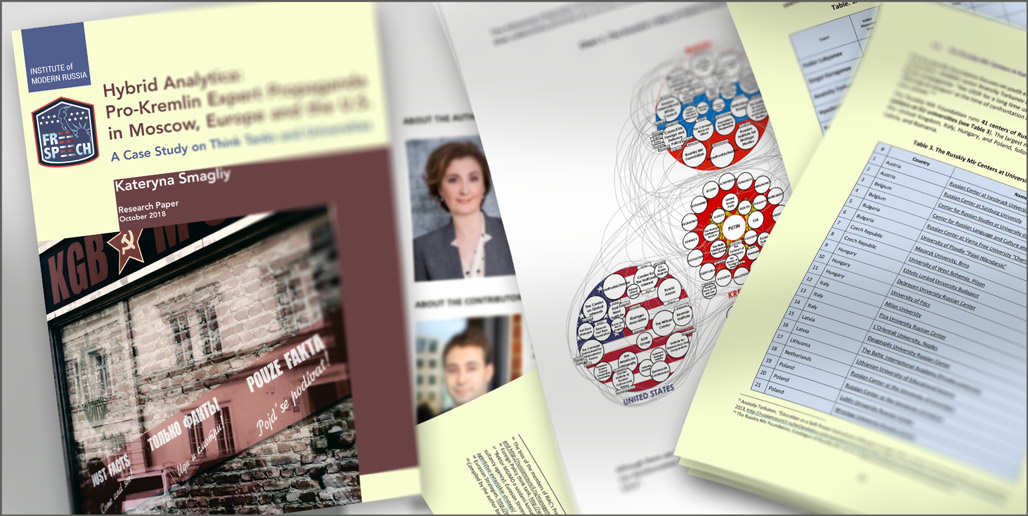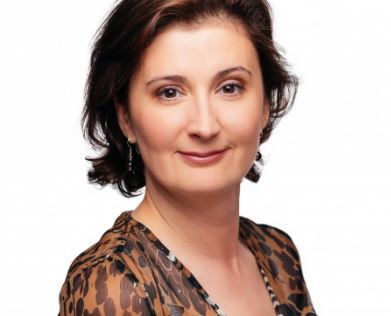According to the paper, the critical element of Russia's hybrid warfare is information warfare, defined as "a comprehensive and concerted state-sponsored influence campaign designed to steer social debate, hijack political, social and media narratives, and distort information context."
The report examines the structure of Kremlin's propaganda-related institutions and their connections with Western and Russian academia, as well as their co-optation into the pool of proxy communicators for the Putin regime. The authors conclude that the current Russian government pursues a coherent "knowledge weaponization" strategy.
Information warfare aims to influence decision-making in the West in a way that would validate the interests of the ruling Russian kleptocracy.
The report details how Kremlin-linked think tanks design ideological doctrines and how Kremlin sympathizers promote pro-Kremlin propaganda narratives in the West.
Hybrid analytica
According to the report, the Kremlin's "knowledge weaponization strategy" has five inter-related components.
- The Kremlin engages domestic think tanks in the design of the communication strategies.
- It established influence centers abroad, operating as organizations of various types such as think tanks, academic Russian study and cultural centers, associations of Russian-speaking immigrants etc.
- The Kremlin uses private actors to promote its interests in the West.
- In information warfare, it relies on Russian intelligence and infiltrates other countries via the network of agents of influence.
- The mass media is used as multipliers, promoters and/or validators of pro-Kremlin narratives and messaging.
These efforts combined led to the rise of the "hybrid analytica," defined in the paper as the process of creation and promotion of pseudo-academic narratives by duped or manipulated academics, experts, or political “lobbyists in disguise,” recruited through the global network of the Kremlin-linked operatives.
The hybrid analytica is used to support and accommodate the agenda of the Putin regime. According to the paper, this results in the "demolition of factuality, disinformation, intentional misinterpretation of events, undermined trust in expertise, and overall pollution of the policymaking and public debate environment."

. The infographic illustrates the network of Russian and Western academic/research institutions that collectively promote pro-Kremlin propaganda narratives. Click on the image for its high-resolution version or download it as a PDF file.
Findings
The report identifies how the Russian state-owned think tanks that are tied to the ruling elite preserve Putin's grip on power, developing policy recommendations for Russian state officials, public experts, and the media.
Rossotrudnichestvo, the Russkiy Mir Foundation, and the Gorchakov Fund - the Russian “soft power” organizations - have established numerous centers of Russian studies at European and American universities for promoting Russia’s cultural diplomacy and broadening the network of Kremlin sympathizers within Western academia.
Various Kremlin-linked oligarchs (Mikhail Fridman, Viktor Vekselberg, Alisher Usmanov and others) poured millions of dollars into Russian “soft power” instruments, Western think tanks, and universities. Such investments are aimed to protect the Kremlin's positions internationally as well as protect their personal business interests.
The paper has also found that several Western think tanks such as the Center for the National Interest (CFTNI) and the Kennan Institute "have started following pro-Kremlin narratives or become involved in direct political lobbying on behalf of the Russian state."
Meanwhile, the Kremlin goes after its critics and ideological opponents. For example, in 2018, a Russian group affiliated with the Russian government attempted to hack into the computers of the Hudson Institute, active in investigations of corruption in Russia.
Another finding is that the professional background of Russian experts and chiefs of Kremlin-linked Russian think tanks indicates their extensive ties to Russian intelligence agencies.
The study has also concluded that EU and US sanctions against Russia have not only considerably restrained Russia’s international political contacts, but have simultaneously created additional professional opportunities for Russian and Western intellectuals.
"At the background of Russia’s deteriorating relations with the West, they suddenly found themselves at the very heart of “track II diplomacy” efforts. Russia’s invitations to the Valdai Club, as well as its generosity and first-class hospitality, have proved hard to decline," reads the report.
Such Russian actions have shaped the phenomenon of Putinverstehers - a growing number of the Western Putin supporters who often excuse their participation in Russian agitprop fora, saying “we must deal with them in order to understand them.
”
Recommendations
The authors have developed a set of recommendations for Western governments, institutions, and civil society on combatting Russian hybrid analytica.
Another recommendation for the governments is to urge education and research institutions to freeze on cooperation and accepting donations from Russian “soft power” organizations like Rossotrudnichestvo. The institutions should update their due diligence rules to prevent any forms of malign Russian influence through Kremlin-friendly oligarchs.
The report calls on civil society and the expert community to monitor academic and research institutions in order to reveal propaganda content disguised as scholarly debates, and to further investigate the extent of connections between the Kremlin and the Western expert community. Special attention should be paid to sources of funding and affiliations of the media outlets that publish analytical Russia-related content. Western journalists and scholars should remember that Russia's Federal Security Service or FSB traditionally targets them at forums, conferences, festivals, and sporting events held in Russia to recruit them as agents of influence.
Read also:
- “Our disagreement with leadership’s pro-Kremlin tendencies ignored”: Ukrainian scholars on closure of Kennan Institute Kyiv office
- Democracies should prepare for the long fight against Russian disinformation warfare: study
- The Kremlin’s chaos strategy in Ukraine and its helpers
- Moscow outlined ‘information spetsnaz’ techniques over a decade ago, Shtepa says
- Academia again serves state ideology as Russia convicts Ukrainian library head
- How Russia infiltrates the media landscape of the Black Sea region
- How the Kremlin influences the West using Russian criminal groups in Europe
- Moscow has complex system to run agents of influence abroad, Khmelnytskyi says
- US indictment sheds light on the Russian troll factory instruction system
- How Russian Church serves Kremlin propaganda
- Kremlin think tank confirms close links with Kremlin and with new Greek premier
- Deception, Disinformation, and Doubt: Hybrid Warfare in Eastern Ukraine
- From objective reporting to myths and propaganda: The story of RIA Novosti
- Kremlin’s targeting of messages makes ‘ideology of hybrid war’ more effective and dangerous than Soviet predecessor, Eidman says
- How the Washington Times spreads Russian propaganda about Ukraine


